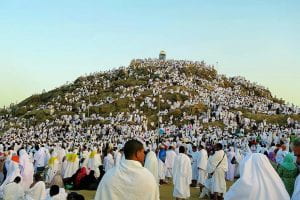 The global Muslim community recently completed the annual Hajj pilgrimage to the sacred city of Mecca.[1] While still allowing far fewer pilgrims than in pre-pandemic times, this was the first time the Hajj was again a truly international gathering since 2019. According to the Qur’an, God commanded the prophet Abraham to be the first to “proclaim the pilgrimage to all people.”[2]
The global Muslim community recently completed the annual Hajj pilgrimage to the sacred city of Mecca.[1] While still allowing far fewer pilgrims than in pre-pandemic times, this was the first time the Hajj was again a truly international gathering since 2019. According to the Qur’an, God commanded the prophet Abraham to be the first to “proclaim the pilgrimage to all people.”[2]
Traditional Qur’anic commentaries say that Abraham asked, “O Lord, how can I convey [this message] to the people when my voice will not reach them?” God said: “Call, and it will be for Me to ensure it reaches the people.” Abraham did the best he could, going to the top of a mountain and calling out to people to make a pilgrimage to the house he had just dedicated at Mecca. It was said that God ensured that this call not only carried throughout the earth but also reached the human family that had yet to be born. Upon reading this verse and these commentaries, Muslims cannot help but marvel that four thousand years later, millions of people respond to this call every year with the chant of “Here we are, God, at your service!”
Whether they seem to come from beyond our control or arise from our own ideals and vision of the future, the challenges we face can seem overwhelming. These challenges may be situations we face as individuals or families, societal problems such as gun violence and extreme polarization, or global problems like climate change, war, and extreme inequality. One can easily imagine Vincent de Paul becoming overwhelmed by seventeenth-century France’s recurrent plagues, religious conflict, and widespread material and spiritual poverty.[3] Facing those same realities, along with the extreme limitations placed on women’s roles, Louise de Marillac could have felt the same.
Certainly, we may have observed in others and in ourselves, some of the common coping strategies for being overwhelmed. These can include selfishness, cynicism, escapism, or wishing for destruction, whether of an idealistic or nihilistic nature. Yet our Vincentian legacy encourages us not to give in to these temptations. As Vincent did, as Louise did, we are invited to make our intentions sincere, to hope for a better future, and to use our “good will and honest efforts” toward securing that future.[4] He taught that our actions are all we can control and that we should leave the rest to forces beyond ourselves. As was the case with Abraham and the call to the Hajj, the work Vincent and Louise started continues today in ways they could never have imagined.
As we face the general challenges mentioned above, or the specific challenges of higher education, or the city of Chicago that we love, let us re-commit ourselves to a beautiful vision of the role DePaul University can play in the present and the future. No doubt challenges foreseen and unforeseen will still find us on our journey. That is the nature of journeys. Yet we may also find ourselves blessed with wonderful companions and miraculous and unexpected openings and transformations along the way.
Reflection: What are some ways in which you feel overwhelmed, personally or professionally? What is your vision of the ways in which DePaul can address the challenges of our time? What does it mean to you to bring your “good will and honest efforts” to your role at DePaul?
Reflection by: Abdul-Malik Ryan, Assistant Director, Religious Diversity & Pastoral Care
[1] This year’s Hajj took place from July 7 to July 12 and was marked by a large degree of logistical confusion. See Dustin Jones, “This Eid al-Adha, the New Rules for Hajj Have Left Many Frustrated,” NPR, July 9, 2022, Religion, https://www.npr.org/2022/07/09/1110580296/saudi-arabia-travel-rules-hajj-frustrated-pilgrimage.
[2] Qur’an Surah Hajj Verse 27.
[3] For additional insights on Vincent’s time and the Vincentian approach to the overwhelming challenge of poverty reduction then and now, see Edward R. Udovic, C.M., “‘Our good will and honest efforts.’ Vincentian Perspectives on Poverty Reduction Efforts,” Vincentian Heritage 28:2 (2010), at: https://via.library.depaul.edu/cgi/viewcontent.cgi?article=1321&context=vhj.
[4] The full quote reads, “Since God is satisfied with our good will and honest efforts, let us also be satisfied with the outcome He gives to them, and our actions will never be without good results.” Letter 962, “To Etienne Blatiron, Superior, in Genoa,” June 21, 1647, CCD, 3:206. Available online at: https://via.library.depaul.edu/vincentian_ebooks/28/.
